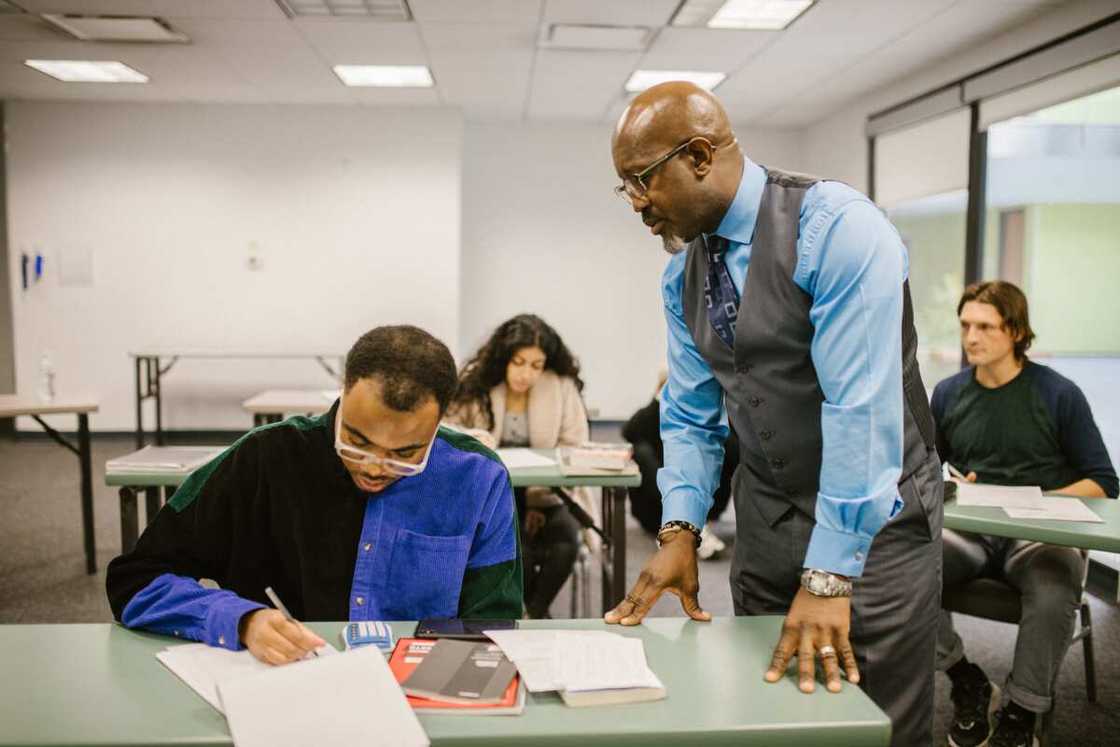What is examination malpractice: causes, effects, and solutions in Nigeria
In almost every country in the modern-day world, examinations are among the primary methods of assessing learners' skills and knowledge. In Nigeria, these exams come in the form of primary school exams, secondary school exams, and those conducted in higher learning institutions. Still, one of the biggest challenges in carrying out these assessments is examination malpractice. This vice has eaten so deep into the Nigerian education system that it can no longer be ignored. What is examination malpractice, and what are its effects?

Source: UGC
Exam malpractice comes in numerous forms and can include any of a wide range of parties, including the examinees, tutors, examiners, and other external forces.
What is examination malpractice?
The definition of examination malpractice is improper or illegal conduct by an examination candidate (examinee) with the intention of passing the examination. While some debate on examination malpractice as a result of inadequate preparation, others believe it is driven by the pressure to achieve high grades.

Read also
"Believe our vision": Spotlight on Nigeria as World Bank stops financial support for Uganda over anti-gay law
Types of examination malpractice

Source: UGC
To define examination malpractice, one must understand that exams are designed to take place under a set of standards. When these standards are breached, it is often in the form of one or more forms of malpractice. Here are the various forms that exam malpractice can take.
- Impersonation: This is one of the best-known forms of examination malpractice in numerous countries worldwide, including Nigeria. Impersonation is the act of pretending to be another person with the aim of helping them cheat and pass the exams.
- External assistance: This vice usually involves exam officers who receive bribes from candidates in exchange for assistance before, during, or after the examinations. These officers can sometimes threaten students, forcing them to part with bribes.
- Giraffing: This term is derived from the physical features of the giraffe, particularly its long neck. This malpractice involves a situation in which an examinee cranes their neck to view what their neighbour is writing and copy it. It is among the oldest forms of exam malpractice.
- Inscription: This involves inscribing notes on one's body or materials allowed into the exam room. Some of the most common include writing notes on one's palm, tables, examination hall walls, and small pieces of paper.
- Collusion: This is the vice that results in what is commonly known as exam leakage. Typically, a candidate colludes with an officer of the exam-setting body, allowing them to get a copy of the questions in advance. They then revise the exact questions.
- Intimidation/assault: Students sitting their exams can sometimes intimidate or assault the officers invigilating the exams. This can be in brandishing weapons or any other form of assault. The exam officers are then forced to let the candidates carry out their wishes, often some other form of cheating.
What are the five causes of examination malpractice?

Source: UGC
Here are the primary causes of exam malpractice in Nigeria.
1. Parenting failure
Parenting is, quite often, the beginning of numerous virtues and vices. Parents typically play an integral role in examination malpractice in Nigeria. Some parents have little interest in their children's academic life.
When exam time comes around, some of these parents are often at the forefront in facilitating cheating for their children to get good grades.
2. A corrupt educational system
One of the most significant aspects to blame is the extent of the rot in the education sector. Today, education is viewed as a business, with some school owners willing to do anything to ensure their institutions come out on top.
Additionally, some institutions employ untrained teachers to reduce their operations costs. This affects students' performance, making them resort to unorthodox methods to attain good grades.
3. Poor students attitude
Since students are the common factor in all forms of malpractice, they bear the biggest responsibility in the vice. Some students have been known to be lazy and seek any shortcut to good grades that do not involve studying and working hard.
Some students do not believe in the tried and tested attributes such as dedication and consistency. As a result of this poor attitude, such students often tend to resort to various forms of examination malpractice.
4. Environmental (societal) factors
Nigerian candidates have found themselves in a society where examination malpractice is celebrated and, sometimes, justified. The environment has a way of influencing students who are quick to embrace norms.
In a society that will go to any lengths to succeed, cheating has become one of the somewhat accepted vices in society.
5. Undue emphasis on academic results
Exam malpractices are on the rise partly due to the high-value society has placed on academic results over skills and professionalism. Thus, everybody wants to get that piece of paper by hook or crook.
What are the 10 effects of examination malpractice?

Source: UGC
Examination malpractice can have various negative effects on individuals, educational institutions, and society as a whole. Here are some of the undesirable effects brought about by exam malpractices.
- Underdevelopment: One of the primary reasons most underdeveloped countries find themselves in precarious situations is the lack of qualified personnel in various economic sectors. This happens when the education sector constantly produces unqualified people who only pass their examinations through cheating.
- Unqualified professionals: Examination malpractice may result in individuals passing exams without the necessary skills and knowledge, leading to a workforce with inadequately qualified professionals.
- Negative impact on prospects: Students involved in examination malpractice may face difficulties in the future, as employers and higher education institutions might question the authenticity of their qualifications.
- Increased corruption: Corruption is among Nigeria's biggest economic problems. Looking at the vice critically, one can see that the corruption in numerous public offices stems from the country's generally corrupt societal and education systems. If students cheat in their exams, they believe they can get away with any form of corruption afterwards.
- Legal and disciplinary consequences: In some cases, examination malpractice can lead to legal actions or disciplinary measures, resulting in serious consequences for the individuals involved.
- Erosion of academic integrity: Examination malpractice undermines the values of honesty, integrity, and fair competition in the educational system, leading to a lack of trust and respect for academic achievements.
- Degradation of educational standards: When students resort to cheating, the true assessment of knowledge and skills becomes compromised, leading to a decline in the overall quality of education.
- Reduced motivation to learn: Students who engage in malpractice may rely on cheating instead of genuinely learning, leading to a lack of motivation for academic excellence.
- Devaluation of certificates: Widespread malpractice can diminish the value of academic certificates and qualifications, impacting the credibility of the entire education system.
- Inequality among students: It can create an uneven playing field, benefiting those who cheat while disadvantaging honest students who work hard.
What are the solutions to examination malpractice?

Source: UGC
Here is a look at some of the possible measures that can be taken to curb exam malpractice.
- Creation of more schools and learning facilities: This will go a long way in ensuring Nigeria's classrooms are not overcrowded. As a result, examinees will have a harder time engaging in vices such as giraffing, which are common in overcrowded exam halls.
- Government should encourage education: In some developed countries, the government actively encourages the populace to acquire education. This is done through numerous incentives such as loans and grants. This goes a long way in curbing malpractice since the students' goals become attaining knowledge and skills.
- De-emphasizing the need for academic results: Given that people are endowed differently, reducing the emphasis placed on academic results would only make sense. Some people acquire knowledge and skills easily but cannot articulate them in an examination paper. Instead, employers should find ways to gauge someone's ability via practical skills, not written examinations.
- Rewarding those who report malpractices: In 2011, the government of Nigeria came up with a new way of nabbing corrupt government officials. This was via an incentive program to reward those who reported corruption cases. The same concept can be applied to exam malpractice.
- Encouraging good parental upbringing: Poor parenting plays a huge role in exam cheating. The government can develop social programs designed to change how parents view their roles in this modern digital era.
What is the standard definition of examination malpractice in Nigeria?

Source: UGC
Examination malpractice meaning is simply improper or illegal conduct by an examination candidate (examinee) with the intention of passing the examination.
What are the three forms of examination malpractice?
The common forms of examination malpractice include:
- Cheating: Involves using unauthorized materials, notes, or devices during an examination. It can also include copying from another student's paper or obtaining answers from external sources such as hidden notes.
- Plagiarism: The act of presenting someone else's work or ideas as your own without giving proper credit or acknowledgement.
- Impersonation: Occurs when a student takes an examination on behalf of someone else, pretending to be that person.
Why do students cheat in their exams?
There are numerous reasons, some of the most common being society's emphasis on academic certificates, overpopulated schools, and poor upbringing.
What are the effects of exam malpractice?
Some of the most detrimental ones include underdevelopment, increased corruption, and a country's loss of integrity.
What is examination malpractice? This is any form of dishonest or fraudulent behavior carried out by individuals during an examination to gain an unfair advantage. It is considered a serious offense in educational settings and is condemned by educational institutions, governments, and society as a whole.
Legit.ng recently explored the effects of colonialism in Nigeria. Like numerous other African countries, Nigeria was under imperial rule since 1914. The country's 46 years of colonial rule were characterized by culture changes, slavery, improved literacy, and improved infrastructure, among other impacts.
The jury is still out on whether the positive effects outweigh the negative ones or not. Nevertheless, the inarguable fact is that post-colonial Nigeria is vastly different from pre-colonial Nigeria in so many aspects.
Source: Legit.ng

Jackline Wangare (Lifestyle writer) Jackline Simwa is a content writer at Legit.ng, where she has worked since mid-2021. She tackles diverse topics, including finance, entertainment, sports, and lifestyle. Previously, she worked at The Campanile by Kenyatta University. She has more than five years in writing. Jackline graduated with a Bachelor’s degree in Economics (2019) and a Diploma in Marketing (2015) from Kenyatta University. In 2023, Jackline finished the AFP course on Digital Investigation Techniques and Google News Initiative course in 2024. Email: simwajackie2022@gmail.com.

Adrianna Simwa (Lifestyle writer) Adrianna Simwa is a content writer at Legit.ng where she has worked since mid-2022. She has written for many periodicals on a variety of subjects, including news, celebrities, and lifestyle, for more than three years. She has worked for The Hoth, The Standard Group and Triple P Media. Adrianna graduated from Nairobi University with a Bachelor of Fine Arts (BFA) in 2020. In 2023, Simwa finished the AFP course on Digital Investigation Techniques. You can reach her through her email: adriannasimwa@gmail.com






